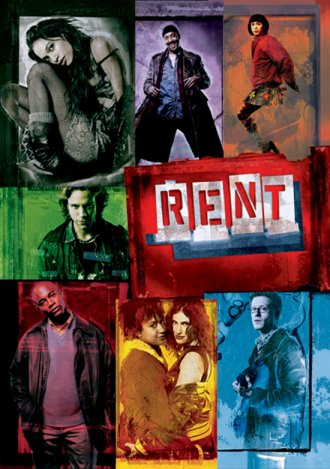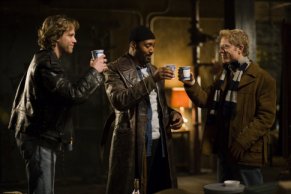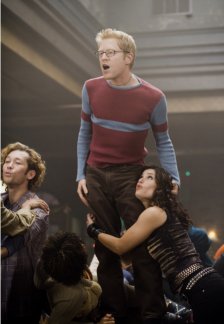Some
things are simply of their time, and of a legend that grew
out of their creation. It seems strange to say that about
a musical scarcely a decade old, but such might be the case
with Rent. If composer Jonathan Larson had not died
before the opening of his musical updating Puccini's La
Boheme (wait...I sense eyeballs glazing) and celebrating
the fleeting nature of life, Rent might have disappeared.
Instead, the legend grew. Rent won a Pulitzer and a Tony for Best Musical. It has become something of a new generation's Rocky Horror Show. To be fair, Rent has a lot more depth, and nobody sings "Sweet Transvestite" at high school graduations like they do "Seasons of Love." Rather than pleading "don't dream it, be it," Rentheads celebrate "La Vie Boheme," but with no less fervor.
Director Chris Columbus and screenwriter Stephen Chbosky had a difficult task in capturing a musical that captured a zeitgeist that may have already passed. They had to both satisfy the cult and try to explain to middle America just why this thing is so loved. In many ways, they succeed.
And yet, a large segment of the population will likely be turned off. As in the stage show, the plot essentially gets underway with the cast angry at eviction notices, opining that they won't pay "…last year's rent." If that turns you against them, nothing else about their lifestyles will make you leave the theater humming any of the tunes.
Before getting into the plot, though, Columbus sets his cast in an empty theater. As they sing the most well-known song, "Seasons of Love," the camera pans across them out of character. It's a strange move that works, acknowledging that this film is capturing a piece of theater history, with six of the original cast members who, yes, have aged beyond their characters but whose performances are preserved here. Hey, we accept it on the WB…
From a studio perspective, using a couple of the original cast seems a canny move. Jesse L. Martin has achieved a certain level of fame for his work on Law & Order, where like the late Jerry Orbach, he rarely gets to truly strut his stuff. Both he and Taye Diggs as the villain of the piece burn up the screen every moment they're on.
Unfortunately, Rent doesn't really focus on them. We instead see the struggles of Mark (Anthony Rapp) and Roger (Adam Pascal) as they struggle for artistic vision and, possibly, happiness.
Pascal exudes a wounded passion, as the rocker with HIV.
It's easy to see him commanding a stage, though it doesn't
quite have the same effectiveness on film. Nor does Rapp,
whose performance can be easily reduced to a couple of poses
and a limited range of hurt looks.
As a would-be filmmaker, it's obvious that Mark is too
busy observing to actually live, though he anchors the showstopping
"La Vie Boheme." It's the only time we get a glimpse of
a character we can really care for, and if Columbus directed
Rapp to be so removed, then it's a mistake.
Still, the cast has an ease with each other that comes out of being reunited on a beloved project. Based on her performance here, Idina Menzel deserves to have a film made of Wicked; onscreen, this woman burns with a sexual intensity that almost blows newcomer to the cast Rosario Dawson away.
Columbus does not limit himself to a slavish stage recreation, and that's a good thing. Using montages that mostly work, he gives weight to some pretty lightweight numbers, combining the actors' earnestness with the reality of life on the streets.
When halfway through the film Mark gets lambasted by a homeless person for his empty liberalism, the moment resonates far more strongly than it would on stage. Even in poverty, the characters live in a strange bubble that life and death keep threatening to burst.
All of it gets tied together in the character of Angel (Wilson Jermaine Heredia), the life force of the story and surprisingly moral center of the tale. He bursts onto the scene in an awkward contrivance that is a weakness of the original book; you just have to take for granted that everybody knows Angel even though it never gets explained.
Columbus underplays Angel's poignancy, keeping it from the mawkishness that tends to seep into his films. Instead, the director focuses on the character's energy, only slightly marring the exuberance of numbers like "Today For You, Tomorrow For Me" with a couple of awkward angles. Again, we can understand how this character just takes the stage by storm.
Enter the movie theater accepting that this film has a
theatricality to it necessary to capture a moment, a movement.
If you can give over to it, Rent will enthrall you.
If you know ahead of time you don't want to see something
so operatic, sit through it anyway because it makes you
look sensitive.









